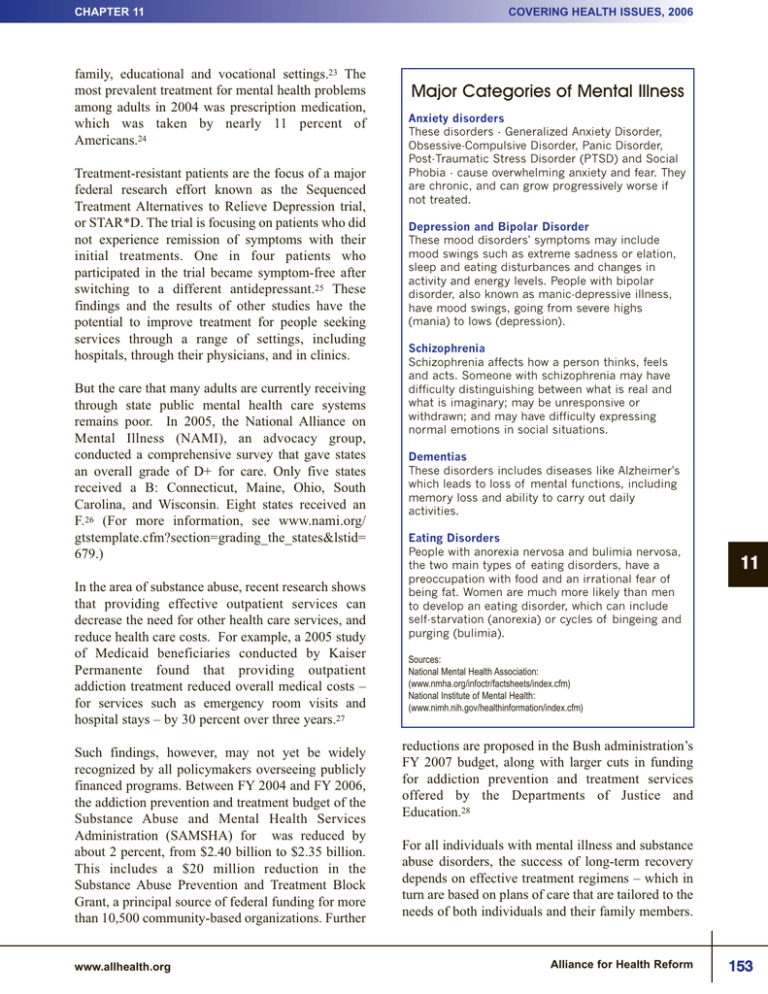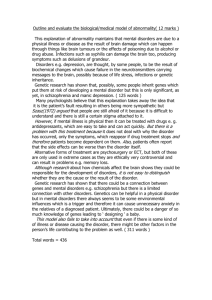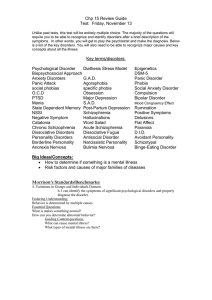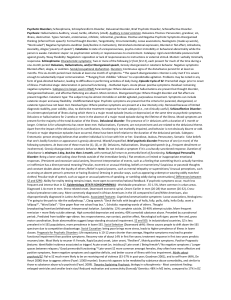11 Major Categories of Mental Illness
advertisement

CHAPTER 11 family, educational and vocational settings.23 The most prevalent treatment for mental health problems among adults in 2004 was prescription medication, which was taken by nearly 11 percent of Americans.24 Treatment-resistant patients are the focus of a major federal research effort known as the Sequenced Treatment Alternatives to Relieve Depression trial, or STAR*D. The trial is focusing on patients who did not experience remission of symptoms with their initial treatments. One in four patients who participated in the trial became symptom-free after switching to a different antidepressant.25 These findings and the results of other studies have the potential to improve treatment for people seeking services through a range of settings, including hospitals, through their physicians, and in clinics. But the care that many adults are currently receiving through state public mental health care systems remains poor. In 2005, the National Alliance on Mental Illness (NAMI), an advocacy group, conducted a comprehensive survey that gave states an overall grade of D+ for care. Only five states received a B: Connecticut, Maine, Ohio, South Carolina, and Wisconsin. Eight states received an F.26 (For more information, see www.nami.org/ gtstemplate.cfm?section=grading_the_states&lstid= 679.) In the area of substance abuse, recent research shows that providing effective outpatient services can decrease the need for other health care services, and reduce health care costs. For example, a 2005 study of Medicaid beneficiaries conducted by Kaiser Permanente found that providing outpatient addiction treatment reduced overall medical costs – for services such as emergency room visits and hospital stays – by 30 percent over three years.27 Such findings, however, may not yet be widely recognized by all policymakers overseeing publicly financed programs. Between FY 2004 and FY 2006, the addiction prevention and treatment budget of the Substance Abuse and Mental Health Services Administration (SAMSHA) for was reduced by about 2 percent, from $2.40 billion to $2.35 billion. This includes a $20 million reduction in the Substance Abuse Prevention and Treatment Block Grant, a principal source of federal funding for more than 10,500 community-based organizations. Further www.allhealth.org COVERING HEALTH ISSUES, 2006 Major Categories of Mental Illness Anxiety disorders These disorders - Generalized Anxiety Disorder, Obsessive-Compulsive Disorder, Panic Disorder, Post-Traumatic Stress Disorder (PTSD) and Social Phobia - cause overwhelming anxiety and fear. They are chronic, and can grow progressively worse if not treated. Depression and Bipolar Disorder These mood disorders' symptoms may include mood swings such as extreme sadness or elation, sleep and eating disturbances and changes in activity and energy levels. People with bipolar disorder, also known as manic-depressive illness, have mood swings, going from severe highs (mania) to lows (depression). Schizophrenia Schizophrenia affects how a person thinks, feels and acts. Someone with schizophrenia may have difficulty distinguishing between what is real and what is imaginary; may be unresponsive or withdrawn; and may have difficulty expressing normal emotions in social situations. Dementias These disorders includes diseases like Alzheimer's which leads to loss of mental functions, including memory loss and ability to carry out daily activities. Eating Disorders People with anorexia nervosa and bulimia nervosa, the two main types of eating disorders, have a preoccupation with food and an irrational fear of being fat. Women are much more likely than men to develop an eating disorder, which can include self-starvation (anorexia) or cycles of bingeing and purging (bulimia). 11 Sources: National Mental Health Association: (www.nmha.org/infoctr/factsheets/index.cfm) National Institute of Mental Health: (www.nimh.nih.gov/healthinformation/index.cfm) reductions are proposed in the Bush administration’s FY 2007 budget, along with larger cuts in funding for addiction prevention and treatment services offered by the Departments of Justice and Education.28 For all individuals with mental illness and substance abuse disorders, the success of long-term recovery depends on effective treatment regimens – which in turn are based on plans of care that are tailored to the needs of both individuals and their family members. Alliance for Health Reform 153




